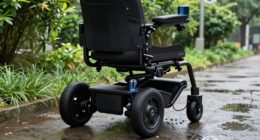When delving into the world of taking care of elderly family members, it is essential to grasp that communication techniques are ingrained and significantly affect the outcomes of caregiving.
Have you ever considered how your upbringing and past interactions with family members impact the way you approach caregiving responsibilities for aging loved ones?
Understanding these underlying dynamics is crucial in fostering collaboration and harmony within the family unit.
Let's explore how acknowledging and addressing these communication patterns can lead to more effective eldercare management and improved familial relationships.
Key Takeaways
- Family unity enhances eldercare effectiveness.
- Acknowledge need for assistance.
- Regular family meetings aid communication.
- Open communication resolves disputes and maintains healthy relationships.
Importance of Family Dynamics in Eldercare
Understanding the significance of family dynamics in eldercare is essential for navigating the complexities of caring for aging loved ones effectively. When it comes to caring for our senior parents, family plays a pivotal role in providing the necessary support and assistance. Navigating family dynamics can be challenging as different members may have varying opinions and roles in the care of aging parents. Communication within the family is key to ensuring that everyone's needs are addressed and that the care provided is comprehensive and holistic. In some cases, unresolved tensions or differing priorities among family members can exacerbate caregiving challenges, leading to disagreements or even conflicts. Addressing these issues early on and fostering open dialogue can help ease the burden and create a collaborative approach. Ultimately, understanding family dynamics and caregiving involves recognizing each member’s unique strengths and limitations, while working together to ensure the best possible care for aging loved ones.
In our journey of eldercare, recognizing the diverse contributions that each family member brings to the table is crucial. Each person's input, whether it be practical help or emotional support, contributes to a more unified and effective caregiving approach. By acknowledging and appreciating the unique strengths that each family member possesses, we can create a supportive environment that meets the needs of our aging loved ones. Together, as a family, we can navigate the complexities of eldercare with compassion and understanding.
Recognizing the Need for Help

Navigating the complexities of eldercare often leads us to a pivotal realization: recognizing the need for help is a crucial step in ensuring the well-being of our aging loved ones. As our parents age, their health and support requirements may increase, posing challenges for us as caregivers. It's essential to acknowledge that we can't do it all alone. Seeking support from friends, family members, or considering professional assistance such as caregivers or assisted living facilities can lighten the burden and provide the necessary care our aging parents deserve.
In facing the reality of our aging parents' needs, organizing a family meeting can be beneficial. This allows for open communication about the current health status of our loved ones and facilitates decision-making regarding their care. Remember, communication is key in maintaining a cohesive approach to eldercare within the family. By recognizing when we need help and reaching out for support, we not only ensure the best possible care for our aging parents but also safeguard our own well-being during this challenging time.
Tips for Family Communication
Regularly scheduling family meetings is an effective way to facilitate open and honest communication about elderly care needs and concerns. By creating a safe space where each family member can express their opinions and challenges, we can better understand the dynamics at play in eldercare.
It's crucial to actively listen to everyone's perspectives and address conflicts constructively, ensuring that respect remains at the core of our discussions. In cases where disagreements persist, involving a professional mediator can help navigate through challenging situations and find common ground.
Emphasizing clear and respectful communication within the family is key to fostering a supportive environment for discussing eldercare needs. Remember, every voice matters, and by working together with empathy and understanding, we can navigate the complexities of family dynamics in eldercare effectively.
These tips aim to guide us in fostering healthy family communication as we navigate the journey of caring for our elderly loved ones.
Resolving Family Disputes

In addressing family disputes in eldercare, fostering open communication and embracing compromise are essential steps towards finding mutually beneficial solutions. When your loved one needs care, disagreements among family members about the best course of action can arise, impacting your parents' health and the overall eldercare situation. Here are some strategies to help navigate and resolve these disputes effectively:
- Maintain Open Communication: Keeping the communication lines open with all family members involved can help ensure that everyone's concerns are heard and addressed.
- Hold Family Meetings: Organizing regular family meetings can provide a structured environment for discussing issues, sharing different perspectives, and working towards solutions together.
- Consider Professional Help: Seeking professional mediation services can offer unbiased support and guidance in resolving conflicts and reaching agreements in eldercare situations.
- Offer Emotional Support: Remember that everyone involved may be experiencing stress and emotions, so offering empathy and emotional support to each other can strengthen family bonds during challenging times.
Navigating Healthy Family Relationships
Maintaining healthy family relationships during eldercare involves actively listening, addressing conflicts constructively, and fostering open and honest discussions. When caring for an elderly parent, involving all loved ones in the decision-making process can help distribute caregiving responsibilities more equitably. Open communication is vital in ensuring that each family member feels heard and valued in the caregiving journey. Resolving conflicts peacefully, without assigning blame, can prevent tension from escalating and promote a harmonious caregiving environment. Seeking the assistance of a geriatric care manager can also provide valuable support in navigating the complexities of assisted living or senior living arrangements.
| Benefits of Navigating Healthy Family Relationships | How It Helps |
|---|---|
| Reduced Tension Among Siblings | Equitably sharing caregiving responsibilities fosters cooperation. |
| Enhanced Family Unity and Understanding | Open and honest discussions promote empathy and mutual support. |
| Improved Quality of Care for Elderly Parent | Resolving conflicts constructively leads to better caregiving outcomes. |
Frequently Asked Questions
What Are the Dynamics of Family Communication?
When it comes to understanding the dynamics of family communication, it's crucial to recognize the intricate interactions, emotions, and relationships that shape our connections.
Effective communication fosters trust, empathy, and collaboration within the family unit. By actively listening, showing empathy, and respecting each other's perspectives, we can create a supportive environment where conflicts are addressed constructively, decisions are made collectively, and our aging parents receive the care and understanding they deserve.
How Do You Resolve Family Dynamics?
When resolving family dynamics, we prioritize open communication, active listening, and understanding.
We establish clear roles and boundaries to prevent misunderstandings and reduce tensions.
Seeking professional mediation services can help facilitate communication and resolve conflicts within the family.
How Is Communication Essential to an Elderly Relationship With Family?
Communication is vital in an elderly relationship with family. It helps us understand and meet our loved ones' needs efficiently. By keeping an open dialogue, we ensure everyone is informed and involved in decision-making.
Conflict resolution becomes smoother, and trust is built through regular, transparent communication. Strong family bonds are nurtured through effective communication, creating a supportive caregiving team for our elders.
How Can Members of a Family Overcome the Effects of Family Dynamics?
We can overcome the effects of family dynamics by fostering understanding, empathy, and compromise. By actively listening to each other's perspectives and needs, we can work towards solutions that benefit everyone.
Collaborating on shared goals and responsibilities can help build trust and unity within the family. Seeking professional guidance when needed can offer valuable support in navigating challenging situations.
Together, we can create a harmonious and supportive environment for our loved ones.
Conclusion
In conclusion, navigating eldercare within the family requires open communication, understanding, and patience. How can we ensure our loved ones receive the best care while maintaining healthy family relationships?
By recognizing the importance of family dynamics, seeking help when needed, and resolving disputes with compassion, we can work together to provide the best possible support for our elderly parents. Remember, we're in this together.









